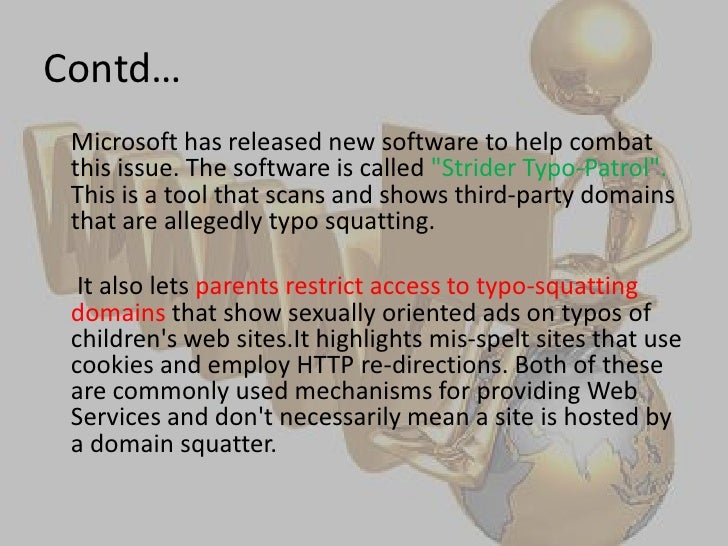
web, in order to prevent their brand from falling into the wrong hands. de should also consider registering other relevant top-level domains, such as. Web operators launching websites under less frequently used domain endings, like. Wrong domain endings: Ever since domain endings were first introduced, brand names and already-established domains have been combined with different endings in order to mislead internet users.For example, websites like may sound correct, but in reality, they have nothing to do with the retail giant and are often used purely for advertising purposes or to spread malware. Hyphens can also be used supplement popular brand names with misleading information. Simply by adding a hyphen between her first and last name, site operators were able to capitalize on the hype surrounding the hotel heiress and attract visitors to the site.
#Typo squatting series
Hyphenated domains: A series of incidents surrounding Paris Hilton showcases how hyphenated domains can be misused for typosquatting. For this reason, those wishing to set-up a fashion blog under the name should also make sure to register the domain so as not to miss out on any potential visitors who are used to reading and writing in British English. Alternative spelling: Alternative spelling options of common product names or services have the potential to confuse internet visitors. So thanks to redirects to the brand’s start page, calling up shouldn’t pose any problem when looking for that jump suit or new pair of sambas. Fortunately, many businesses, such as Adidas, have managed to register misspelled variants of their site’s name before others could beat them to it. Many popular websites are simply spelt incorrectly, and squatters are well aware of this fact. Spelling errors: it would be too easy to blame every online misadventure on the keyboard. Opportunists have since taken advantage of the online resource’s inaction by setting up misspelled variants of the site’s name often these imposturous sites feature content of a much more questionable variety than that of their educational counterpart. The popular online encyclopedia, Wikipedia, failed to take initiative on this matter. Users who access these are then forwarded to Google’s start page. But the Californian market leader isn’t about to let any potential users slide through their hand so easily: Google made sure to quickly register all potential typo domains themselves. Such behavior can result in becoming, , or. Those who normally type quickly and imprecisely or rely heavily on autocorrect are especially prone to becoming victims of these domain types. Typos: perhaps the most common error when entering search information, typos are often the product of our rushed day-to-day lives. For this reason, it’s recommended to keep an eye on the most popular falsifications of your own website and, if possible, register them yourself. And typosquatting doesn’t only present a problem to users: business owners are also affected, as every stolen visitor is a potentially lost customer. 
The worst case scenario that users may come across are counterfeit websites aiming for their personal data.

Setting up a site aiming to siphon off users who’ve mistyped a particular name is an especially lucrative business models for fraudsters: these generally lead to web-optimized landing pages or pornographic content, which generate particularly high revenue streams for their owners. Operators of such sites rely on common typos, like, spelling errors, and will even resort to adding additional information or endings to popular domain names. Manually entering domains into a browser search bar can result in the user being led to a squatted domain instead of the originally desired address. The typo-prone nature of many websites makes up the foundation of this business model. Typosquatting is a type of cybersquatting that involves registering domains with the intentionally misspelled names of popular web presences and filling these with more-or-less untrustworthy content.






 0 kommentar(er)
0 kommentar(er)
